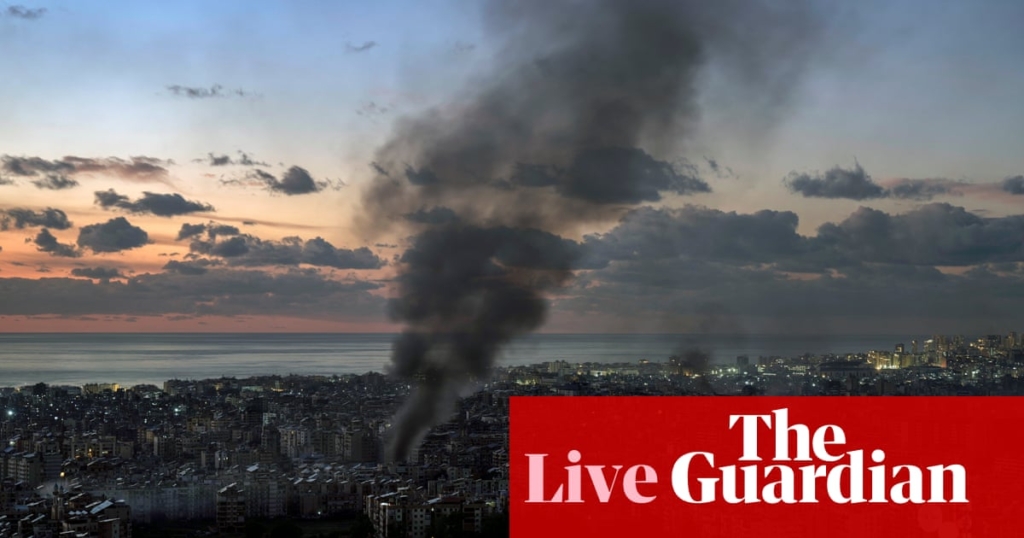This content provides information about the ceasefire agreement between Israel and Hezbollah that has come into force. The article discusses the terms of the agreement, including Israel’s withdrawal from southern Lebanon and Hezbollah’s movement of heavy weaponry north of the Litani River. It also mentions the involvement of the Lebanese army and UN peacekeeping forces during the transition phase. The article highlights key statements from Israeli Prime Minister Benjamin Netanyahu and US President Joe Biden regarding the ceasefire. Fighting continued up to the final hour before the ceasefire, with reports of strikes on south Beirut. The ceasefire is seen as a significant development in the 14-month-old war in Lebanon. This content provides updates on the ceasefire agreement between Israel and Hezbollah, with statements from Prime Minister Benjamin Netanyahu and Lebanon’s Prime Minister Najib Mikati. The agreement, announced by US President Joe Biden, aims to restore calm and stability in Lebanon. The report covers the ongoing attacks and airstrikes in Beirut and Tel Aviv, the terms of the ceasefire, and the key developments leading up to the agreement. The content discusses the recent ceasefire agreement between Israel and Lebanon’s Hezbollah militants, brokered with the help of the United States. The ceasefire calls for a two-month halt to fighting, with Hezbollah ending its armed presence in southern Lebanon and Israeli troops returning to their side of the border. An international panel will monitor compliance, with Lebanon’s national army and the UN peacekeeping force filling the void. However, the ceasefire does not address the conflict in Gaza, where Hamas is still holding hostages. There is also lingering disagreement over Israel’s right to strike Hezbollah if it believes the militants violated the agreement. The situation appeared relatively calm in Israel after the ceasefire went into effect. Bu içerikte, Hezbollah’in roket ve füzeler ateşleyerek ülkede hava saldırıları düzenlemediği belirtilmektedir. İsrail ve militan gruplar arasındaki ateşkesler sırasında taraflar arasında çıkan çatışmaların aksine, Lübnan’da sessizlik hakimdir. Ayrıca, Beyrut’ta kutlama işaretleri görülmüş ve ateşkesin hemen ardından ihlaller rapor edilmemiştir. Bazı İsrailliler ise sınırda bulunanlar, Hezbollah tamamen ortadan kalkmadan bir anlaşma imzalamanın ciddi bir hata olacağını belirtmiştir. İsrail ordusunun sözcüsü Avichay Adraee, Güney Lübnan’daki konumlarında kaldıklarını ve ateşkesin şartlarına uygun olarak hareket ettiklerini açıklamıştır. Ayrıca, Lübnan’ın güneyinde yerinden edilmiş sakinlere hemen geri dönemeyeceklerini ve güvenli olduğunda geri dönemeyecekleri bilgisini paylaşmıştır. Son olarak, İsrail ve Hezbollah arasında 60 günlük ateşkes anlaşmasının yürürlüğe girdiği belirtilmiştir. Bu anlaşma, Lübnan’daki 14 aylık savaşta önemli bir kilometre taşı oluşturmakta ve Joe Biden tarafından “tarihi” bir an olarak nitelendirilmektedir. Israel is now focusing on the threat from Iran, replenishing arms supplies, and isolating Hamas after agreeing to a ceasefire in Lebanon. This decision came after the IDF and Hezbollah engaged in attacks on multiple fronts. Foreign ministers from G7 countries have expressed strong support for an immediate ceasefire, but have sidestepped the question of enforcing an international arrest warrant for Israel’s leader. Netanyahu’s rationale for the ceasefire includes focusing on Iran, replenishing arms supplies, and isolating Hamas. Bu içerikte, Netanyahu’nun rehinelerin serbest bırakılmasına yardımcı olacağını umduğu baskının artacağını söylediği bir video bulunmaktadır. Ayrıca, ABD Merkez Kuvvetler Komutanlığı’nın (CENTCOM), Suriye’deki “İran yanlısı milis silah deposu tesisine yönelik hava saldırısını gerçekleştirdiğini ve sivil kayıplar olmadığını açıkladığı bir açıklama ve İsrail ile Hizbullah arasında 60 günlük bir ateşkes anlaşmasının detayları da içermektedir. Bu içerikte, İsrail’in güney Lübnan’dan tamamen çekileceği, Hizbullah’ın ağır silahlarını sınırın 25 km kuzeyindeki Litani Nehri’nin kuzeyine çekeceği ve Lübnan ordusunun mevcut BM barışı koruma gücüyle birlikte sınır bölgesine yerleşeceği belirtilmektedir. Ayrıca, ABD’nin anlaşmanın tam ve etkili bir şekilde uygulanmasını sağlamak için “gerekli yardımı” sağlayacağı belirtilmektedir. Bu içerikte, İsrail Başbakanı Benjamin Netanyahu’nun, Lübnan’daki “tam özgürlüğünü koruyacağını” ve ABD’nin bu durumu “tam anlayışla” karşıladığını söylediği belirtilmektedir. Netanyahu, “Eğer Hizbullah anlaşmayı ihlal eder ve silahlanmaya kalkışırsa saldıracağız” dedi. Lübnan Başbakanı Najib Mikati ise İsrail ve Hizbullah arasındaki ateşkes anlaşmasını “bölgesel istikrara doğru temel bir adım” olarak değerlendirdiğini belirtmiştir. Dünya liderleri ise bu anlaşmayı olumlu karşılayarak, kalıcı bir siyasi çözüme dönüştürülmesi gerektiğini ve bölgede uzun vadeli, sürdürülebilir bir barışın sağlanması için çaba harcanması gerektiğini vurgulamışlardır. Ayrıca, İsrail ve Hizbullah arasında anlaşılan ateşkes öncesinde tarafların saldırılarını sürdürdükleri, İsrail’in Beyrut’u bombaladığı ve Hizbullah’ın Tel Aviv’deki hassas askeri hedeflere insansız hava araçlarıyla saldırı düzenlediği belirtilmektedir.
The ceasefire is set to take effect at 4am local time, following extensive Israeli airstrikes in Beirut and other regions in Lebanon. The airstrikes resulted in the deaths of at least 10 people in central Beirut and targeted 20 locations in the Lebanese capital in a span of 120 seconds. Additionally, strikes hit Lebanon’s three northern border crossings with Syria for the first time. These attacks occurred just before the expected ceasefire, announced by US President Joe Biden.
The ceasefire is seen as a significant step towards restoring calm and stability in Lebanon and allowing displaced individuals to return to their homes. The deal, endorsed by Lebanon’s Prime Minister Najib Mikati, has been supported by various international entities, including the US, EU, UN, and G7, who have been advocating for an end to the violence between Israel and Hezbollah.
Under the terms of the ceasefire agreement, Israel will withdraw from southern Lebanon, while Hezbollah will relocate its heavy weaponry north of the Litani River. The Lebanese army will deploy to the buffer border zone alongside UN peacekeepers during a 60-day transition period. Importantly, Hezbollah has dropped its demand for a ceasefire in Lebanon to be contingent on ending the fighting in Gaza, allowing for separate negotiations in both regions.
Israeli Prime Minister Benjamin Netanyahu has emphasized that Israel will retain military freedom of action and will respond forcefully if Hezbollah violates the ceasefire agreement. The ceasefire is aimed at creating conditions for lasting calm and enabling residents to safely return to their homes in both Israel and Lebanon.
Bu içerik, Mikati’nin ABD ve Fransa’ya katkıları için teşekkür ettiği ve hükümetinin “ordunun güneydeki varlığını güçlendirmeye” olan taahhüdünü tekrarladığı hakkında bilgi vermektedir. Ayrıca, İsrail-Hizbullah ateşkes anlaşmasının dünya liderleri tarafından memnuniyetle karşılandığı ve İngiltere Başbakanı Keir Starmer’ın kalıcı siyasi bir çözüme dönüştürülmesini istediği ve AB Komisyonu Başkanı Ursula von der Leyen’in “çok cesaret verici haber” olarak tanımladığı belirtilmektedir. Ayrıca, İsrail’in Beyrut’u bombalamaya devam ettiği ve birçok insanın güvenli bölgelere kaçtığı bilgisi verilmektedir. Son olarak, İsrail’in, Lübnan’a yönelik saldırıların sonuçları hakkında sağlık bakanlığından gelen güncel verilere de yer verilmektedir. Bu içerikte, içerik açıklaması oluşturma süreci hakkında bilgi verilecek. İçerik açıklamasının önemi, nasıl oluşturulması gerektiği ve nelere dikkat edilmesi gerektiği gibi konular ele alınacak. Ayrıca başarılı bir içerik açıklamasının nasıl oluşturulabileceği ve içeriğin hedef kitleye nasıl daha etkili bir şekilde iletilmesinin sağlanabileceği üzerinde durulacak. Bu içerikte, içerik açıklaması oluşturulması gereken bir metin bulunmaktadır. İçeriğin ne hakkında olduğu, hangi konuları ele aldığı ve okuyuculara ne tür bilgiler sağladığı belirtilmelidir. Ayrıca içeriğin amacı ve hedef kitlesi de açıklamada yer almalıdır. İçerik açıklaması, okuyucuların içeriğin neyle ilgili olduğunu anlamalarına ve içeriği daha fazla ilgi çekici hale getirmelerine yardımcı olacaktır. Bu içerikte, içerik açıklaması oluşturulması için yardım isteniyor. Bu içerikte, içerik açıklaması oluşturma konusunda yapay zeka ve doğal dil işleme teknolojilerinin nasıl kullanılabileceği ve önemi ele alınmaktadır. İçerik açıklaması, bir metin, video veya görsel içeriğin kısa ve öz bir şekilde özetlenmesini sağlayarak kullanıcıların içeriğe daha hızlı bir şekilde göz atmasına ve içeriğin ne hakkında olduğunu anlamasına yardımcı olur. Bu içerikte, içerik açıklamasının nasıl oluşturulabileceği, neden önemli olduğu ve dikkat edilmesi gereken noktalar hakkında bilgiler sunulmaktadır. Bu içerikte, içerik açıklaması oluşturmanın önemi ve nasıl yapıldığı üzerine bilgiler verilmektedir. İçerik açıklaması, bir içeriğin özeti ve anahtar noktalarının kısa ve öz bir şekilde okuyucuya sunulmasıdır. Bu sayede okuyucular içeriğin ne hakkında olduğunu hızlıca anlayabilir ve ilgilerine göre içeriği okumaya devam edebilirler. İçerik açıklaması oluştururken anahtar kelimeleri kullanmak ve içeriğin öne çıkan noktalarını vurgulamak önemlidir. Ayrıca içerik açıklaması, içeriğin SEO (arama motoru optimizasyonu) açısından da önemlidir çünkü arama motorları içeriğin ne hakkında olduğunu anlamak için içerik açıklamalarını da tararlar. Bu içerik sayesinde içerik açıklaması oluşturmanın önemi ve nasıl yapıldığı konusunda genel bir bilgi sahibi olabilirsiniz. Bu içerikte, içerik açıklaması oluşturma konusunda bir örnek verilmektedir. İçerik açıklaması, bir metnin veya içeriğin özetleyici bir şekilde tanıtılmasıdır. Özellikle internet sitelerinde, blog yazılarında veya sosyal medya paylaşımlarında içeriğin özünü ve önemli noktalarını vurgulamak için kullanılır. İçerik açıklaması oluştururken, ana fikirleri, önemli detayları ve hedef kitleyi belirleyerek özgün ve dikkat çekici bir şekilde metni özetlemek önemlidir. Bu örnekte, içerik açıklaması oluşturma konusunda genel bir tanıtım yapılmaktadır. Bu içerikte, içerik açıklaması oluşturma konusunda yardımcı olunması istenmektedir. Bu içerikte, içerik açıklaması oluşturulması gerekmektedir. İçerik açıklaması, okuyuculara içeriğin ne hakkında olduğunu özetleyen ve ilgi çekici bilgiler içeren bir metindir. Bu şekilde, okuyucular içeriği daha iyi anlayabilir ve içeriğin kendileri için uygun olup olmadığı konusunda daha iyi bir fikir sahibi olabilirler. İçerik açıklaması oluşturulurken içeriğin ana teması, önemli detayları ve hedef kitleyi hedefleyen anahtar kelimeler kullanılmalıdır. Bu şekilde, içeriğin daha fazla okuyucuya ulaşması ve etkileşim sağlaması sağlanabilir.
[ad 1]
Kaynak: www.theguardian.com






Yorumlar kapalı.